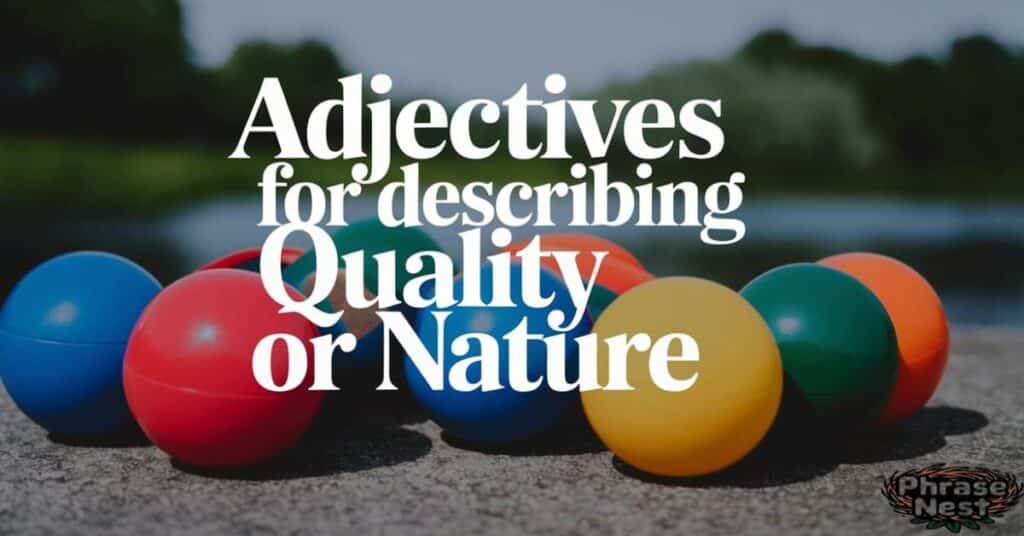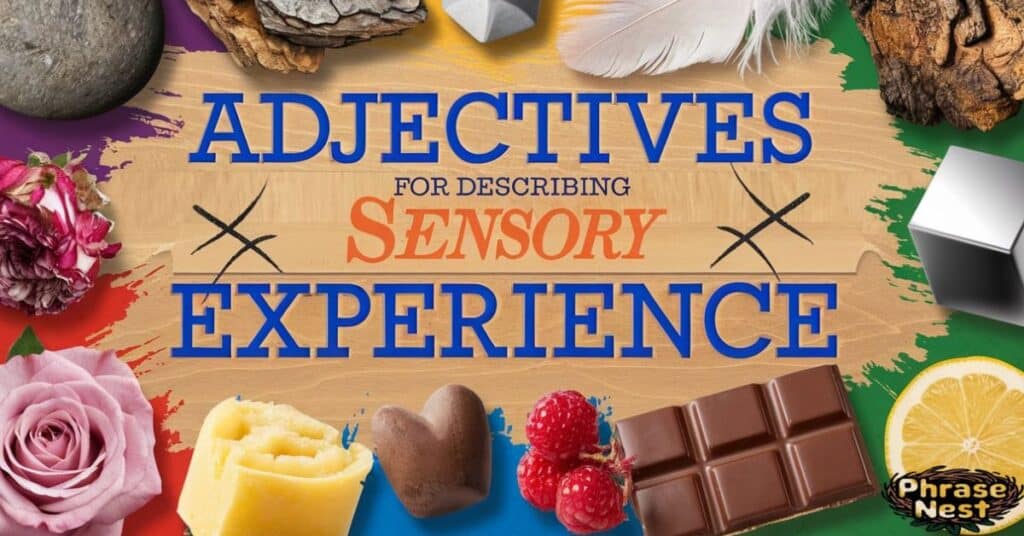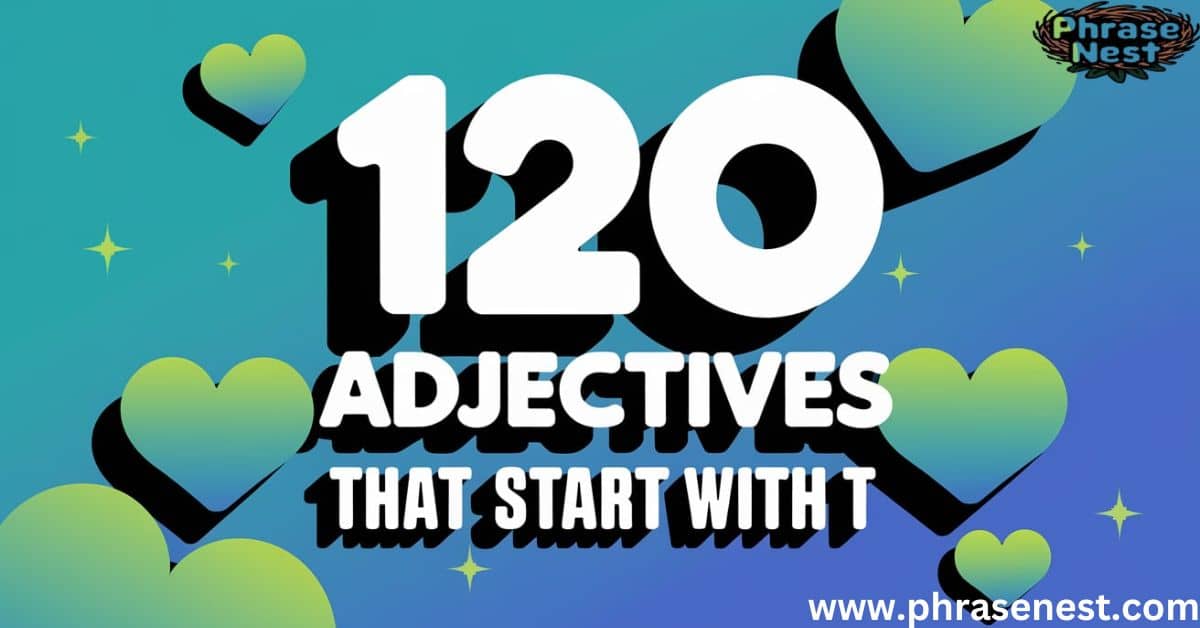Adjectives that start with T can take your writing to the next level, adding texture and depth to your descriptions. Whether you’re writing creatively or simply aiming to sound more articulate, these words are a great way to capture attention and evoke strong imagery. Think of words like “tantalizing” or “towering” – powerful, vivid, and full of meaning.
If you’re ready to explore some exciting new adjectives that can spice up your vocabulary, you’re in the right place. Keep reading as we dive into 50 adjectives that start with T, each bringing something unique to your language toolbox!
Adjectives That Describe Personality Traits
Adjectives starting with “T” can help define a person’s character or demeanor, adding texture to your descriptions. Here are some useful ones to consider:
- Tolerant – Willing to accept opinions or behavior that one may not necessarily agree with.
- Tactful – Showing sensitivity in dealing with others, especially to avoid offense.
- Thoughtful – Showing consideration for the needs of others; caring and attentive.
- Trustworthy – Reliable and able to be depended on.
- Turbulent – Unsettled, chaotic, and marked by conflict or disorder.
- Tenacious – Determined and persistent in the face of challenges.
- Tired – Feeling the need for rest or sleep.
- Tense – Stretched tight or feeling anxious.
- Tender – Gentle, kind, or soft in nature.
- Tragic – Relating to or characteristic of a tragedy; sorrowful.
Adjectives for Describing Size and Shape
When it comes to describing objects or spaces, size and shape are key details. Here are some adjectives starting with T that can help in these descriptions:
- Tiny – Extremely small in size.
- Tall – Having a greater height than average.
- Thick – Having a large distance between opposite sides; dense or heavy.
- Trim – Neat and in good shape; slim.
- Tight – Close-fitting or difficult to move.
- Towering – Extremely tall or reaching a great height.
- Tapering – Gradually decreasing in size.
- Tenuous – Weak or slight; not dense or substantial.
- Tidy – Neat and well-organized.
- Truncated – Shortened or cut off at the top or end.
Adjectives to Describe Emotions or States of Being
Emotions and feelings are integral to human experience, and using precise adjectives can paint a clearer picture of these states. Here’s a selection of adjectives that start with T:
- Tense – Nervous or anxious.
- Triumphant – Feeling or expressing victory or achievement.
- Tender – Soft and emotionally sensitive.
- Turbulent – In a state of unrest or confusion, often emotionally.
- Touching – Evoking strong emotions, often related to empathy or sadness.
- Troubled – Experiencing distress or worry.
- Timid – Shy or lacking in self-confidence.
- Teary – Full of tears or inclined to cry.
- Tearful – Affected by sorrow, often with tears.
- Thrilled – Extremely excited or pleased.
Adjectives to Describe Actions and Movements
Describing actions and movements effectively can make writing more dynamic and engaging. Here are some adjectives that begin with “T” and can describe action:
- Turbulent – Involving strong, chaotic movement or disturbance.
- Tiring – Causing fatigue or exhaustion.
- Tantamount – Equivalent in value, significance, or effect.
- Twirling – Spinning or rotating quickly.
- Throbbing – Beating or pulsing, often used to describe pain or a rhythmic sound.
- Tumbling – Falling or rolling in a clumsy or uncontrolled manner.
- Tapping – Lightly striking or touching with repeated quick motions.
- Treading – Stepping or walking carefully or deliberately.
- Tugging – Pulling something with a sharp or sudden motion.
- Tossing – Throwing something lightly or casually.
Adjectives for Describing Appearance or Aesthetics
Appearance is everything when you’re describing people, places, or objects. The following adjectives starting with “T” can help refine your descriptions:
- Trendy – Stylish and fashionable, in line with current trends.
- Tarnished – Having lost its shine or luster; often used to describe a surface.
- Twinkling – Sparkling with a flickering light.
- Textured – Having a surface that is rough, smooth, or patterned.
- Tinted – Slightly colored or shaded.
- Transparent – Clear, with nothing obscuring what’s behind it.
- Timeless – Not affected by time or fashion, lasting forever.
- Tacky – Lacking in good taste or elegance; cheap or gaudy.
- Tattered – Torn and worn, usually used to describe something old or ragged.
- Tropical – Relating to warm climates with lush vegetation, often used to describe vivid colors or scenes.
Here are 50 more unique adjectives that start with the letter T, divided into useful categories for descriptive purposes.
Adjectives for Describing Quality or Nature

- Tangible – Perceptible by touch; real and concrete.
- Tolerant – Showing willingness to accept views or behaviors different from one’s own.
- Trivial – Of little importance or value.
- Turbulent – Characterized by unrest or disorder.
- Tempered – Moderate or restrained, especially in terms of temperament or emotion.
- Terrible – Extremely bad or unpleasant.
- Teeming – Abundant in quantity, often used to describe something full or overflowing.
- Trifling – Insignificant or unimportant.
- Tight-knit – Close in terms of relationships, often used to describe groups or families.
- Tidy – Neat and organized.
Adjectives to Describe Sound or Noise
- Thundering – Extremely loud, like thunder.
- Tinkling – A light, clear, ringing sound, like a bell.
- Throaty – Deep or harsh-sounding, often used to describe a voice.
- Tuning – Related to adjusting the pitch of something, especially a musical instrument.
- Trilling – A high-pitched, melodic sound, especially from birds or instruments.
- Turbulent – Violent or chaotic sound, like waves crashing or strong winds.
- Tapping – A light, repetitive noise, like knocking or drumming on a surface.
- Timid – Soft or lacking in confidence, often used to describe a quiet voice.
- Thick – A dense sound, as in a thick voice or foggy atmosphere.
- Tuneful – Melodic or harmonious in sound.
Terms to Describe Time and Seasons
- Timeless – Not affected by time, lasting forever.
- Transient – Temporary, lasting only for a short period of time.
- Tardy – Late, especially in terms of arriving after the expected time.
- Trendy – Fashionable or reflecting the current period.
- Taut – Tense or stretched, often used to describe time or emotions.
- Torrential – Heavy or violent, often used for rainfall or storms.
- Tangled – Complex or confused, often referring to time or situations.
- Twelve-hour – Lasting or occurring for twelve hours.
- Tensile – Related to tension, especially in relation to strength or durability over time.
- Timely – Happening at a favorable or right moment.
Words to Describe Behavior
- Trusting – Inclined to place confidence in others.
- Truculent – Aggressive, eager to fight or argue.
- Turbulent – Full of confusion, conflict, or disorder in one’s actions.
- Tolerable – Able to be endured or accepted without difficulty.
- Taciturn – Reserved or uncommunicative, often in speech.
- Thoughtful – Showing consideration for others.
- Tactile – Relating to the sense of touch, often describing someone who is physically affectionate.
- Trendy – Following the latest fashion or behavior trends.
- Temperamental – Prone to unpredictable behavior or emotions.
- Tense – Nervous or anxious, often leading to strained actions.
Terms for Colors and Visuals
- Turquoise – A bright blue-green color, often associated with gems or oceans.
- Taupe – A grayish-brown color.
- Transparent – Clear and allowing light to pass through, without obstruction.
- Tangerine – A bright, orange color.
- Teal – A dark blue-green color.
- Terracotta – A reddish-brown color, resembling fired clay.
- Tawny – A warm, sandy color, often used to describe animals or fur.
- Titanium – A metallic, shiny gray-silver color.
- Tart – Sharp and sour, often used in reference to the color of food or flavor.
- Twilight – The dimming light during sunset or sunrise, often used to describe soft, cool colors.
Descriptive Terms for Objects or Materials
- Tactile – Related to the sense of touch; having a texture.
- Threadbare – Worn out, especially fabric, to the point of being thin or ragged.
- Tough – Strong and durable, resistant to wear and tear.
- Translucent – Allowing light to pass through, but diffusing it so objects are not clearly visible.
- Turbid – Cloudy or murky, especially used to describe liquids.
- Tinny – Having a thin, metallic sound, often used to describe objects.
- Tensile – Capable of being stretched without breaking.
- Tacky – Sticky or cheap in appearance.
- Truncated – Cut short, often used to describe objects that have been shortened or altered.
- Tempestuous – Full of strong, storm-like qualities, especially used to describe material conditions.
Descriptive Adjectives for Actions
- Twirling – Spinning or rotating rapidly in a circular motion.
- Tackling – Engaging in or handling a task or problem with determination.
- Tugging – Pulling sharply or with force.
- Treading – Walking carefully or with a particular step, often used in a controlled manner.
- Thrusting – Pushing forward with force.
- Tapping – Gently striking a surface, often used with fingers.
- Tumbling – Falling or rolling in a disorganized manner.
- Turning – Changing direction or position.
- Trailing – Following behind, often slowly or in a dragging manner.
- Tapping – Producing a sound by gently striking something, often used for rhythm or attention.
Adjectives for Describing Sensory Experience

- Tangy – Having a sharp taste or smell, often used to describe food or scents.
- Tasty – Having a pleasing flavor or enjoyable to the taste.
- Tactile – Related to touch; able to be felt or touched.
- Tranquil – Calm and peaceful, often describing a sensory environment.
- Teeming – Full of life or activity, often referring to busy or sensory-rich environments.
- Tolerable – Capable of being endured, often used for physical sensations.
- Tinnitus – A ringing or buzzing sensation in the ears.
- Ticklish – Sensitive to touch, often causing laughter or physical reactions.
- Tactile – Related to touch; having a sensory element that can be physically felt.
- Tactile – Able to be perceived by the sense of touch, often used to describe sensations.
Quiz: Adjectives That Start with T
1. Why are adjectives that start with “T” useful in writing?
A) They make writing sound more complex
B) They add texture and depth to descriptions
C) They make writing harder to understand
D) They are rarely used in English writing
Answer: B) They add texture and depth to descriptions
2. What is an example of an adjective starting with “T” mentioned in the introduction?
A) Tall
B) Tantalizing
C) Tiny
D) Thoughtful
Answer: B) Tantalizing
3. What can adjectives starting with “T” help improve in writing?
A) Sentence length
B) Word complexity
C) Clarity and vivid imagery
D) Grammar accuracy
Answer: C) Clarity and vivid imagery
4. What is the primary purpose of the article?
A) To explore synonyms of adjectives
B) To list 50 adjectives starting with “T”
C) To provide the history of adjectives
D) To teach grammar rules
Answer: B) To list 50 adjectives starting with “T”
5. What tone does the article adopt to engage readers?
A) Formal and academic
B) Humorous and sarcastic
C) Friendly yet authoritative
D) Casual and informal
Answer: C) Friendly yet authoritative
Conclusion
Using adjectives that start with “T” offers an abundance of ways to enrich your writing, helping you describe people, places, and actions with greater precision and flair. By choosing the right adjective, you bring your descriptions to life, whether you’re writing a novel, a professional email, or simply adding a bit more color to your everyday language.
Now that you have a variety of adjectives at your disposal, consider how you can start incorporating them into your daily vocabulary. Can you think of new ways to express emotions or describe appearances in your writing? Keep experimenting with these adjectives to enhance your descriptions and improve your storytelling.

Annie Bellish, an author at Phrasenest.com, brings clarity and precision to her articles on grammar and language. Known for her insightful, articulate, and concise writing, she simplifies intricate grammar rules and shares practical tips. Annie’s passion for language shines through her engaging content, helping readers express themselves with confidence and eloquence.

